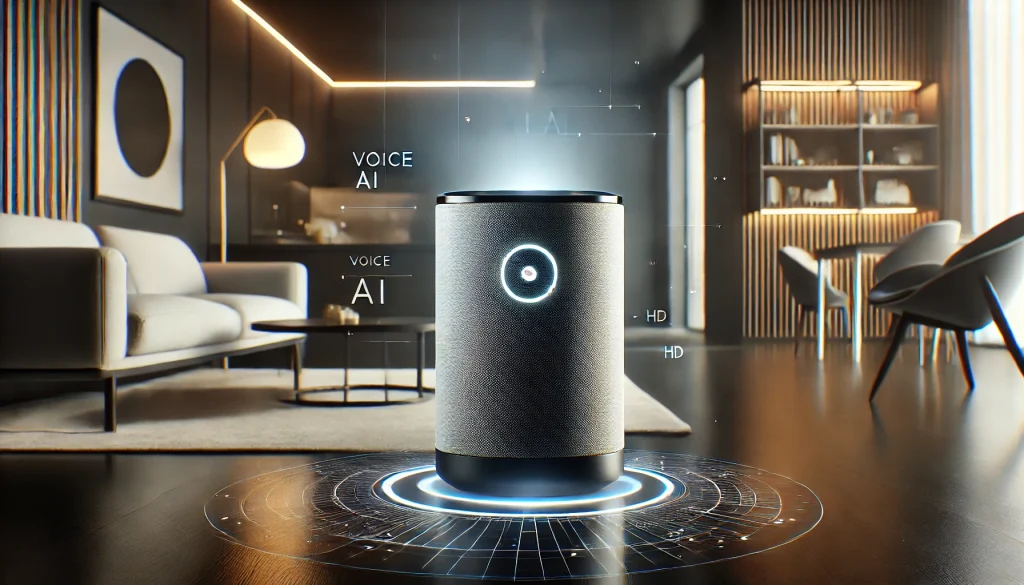Recent developments in AI technology have seen significant strides, particularly with OpenAI’s advancements in voice capabilities. The release of ChatGPT’s realistic-sounding voice AI for Plus users marks a substantial leap forward, promising to enhance user interaction and redefine industry standards. This breakthrough is poised to revolutionize how users engage with AI, setting a new benchmark in the industry and highlighting the rapid pace of technological innovation in natural language processing.

OpenAI’s Voice AI for ChatGPT
OpenAI has unveiled a new voice feature for ChatGPT, now available to Plus users. This development comes after extensive research and testing, aiming to provide a more natural and engaging user experience. The realistic-sounding voice AI leverages advanced speech synthesis technology and natural language processing, setting a new benchmark in conversational AI. This update is part of OpenAI’s continuous efforts to innovate and push the boundaries of artificial intelligence, making interactions with machines more seamless and human-like.
The new feature mimics human speech patterns closely, creating an immersive and interactive experience for users. OpenAI’s Voice AI is an advanced technology that enables AI models like ChatGPT to interact using a realistic, human-like voice. This voice AI uses deep learning models to generate speech that mimics human intonation, pitch, and rhythm. This offers users an immersive and natural conversational experience with the AI. OpenAI’s commitment to enhancing AI capabilities is evident in this latest release, showcasing cutting-edge technology. The tool focuses on human speech subtleties, including intonation, pauses, and emotional nuances, significantly improving AI communication quality and effectiveness.
Global Rollout of OpenAI’s Voice AI Feature

The voice AI feature was officially rolled out on July 30, 2024, and is available globally to ChatGPT Plus users.
This strategic release aligns with OpenAI’s goal to expand premium offerings and enhance the value for its subscribers. Notably, OpenAI’s Voice AI is an advanced technology that enables AI models to interact using a realistic, human-like voice. Moreover, this voice AI leverages deep learning models to generate speech that mimics human intonation, pitch, and rhythm. This offers users an immersive and natural conversational experience with AI. Furthermore, by making this feature available worldwide, OpenAI ensures users from different regions benefit from this technological advancement.
The timing of this release is particularly significant, as it comes when demand for advanced AI capabilities is at an all-time high. With more people working remotely and relying on digital tools for communication, the introduction of realistic-sounding voice AI meets a crucial need for effective and engaging interactions. This global rollout demonstrates OpenAI’s dedication to making its voice AI innovations accessible to a broad audience. This approach fosters a more inclusive technological landscape for users worldwide.
Key Figures Behind OpenAI’s Voice AI
Key figures in this development include OpenAI’s voice AI research and engineering teams, led by prominent AI experts such as Greg Brockman and Ilya Sutskever. Their collective expertise has been instrumental in refining the voice technology to achieve its current level of realism and functionality. The team’s dedication to advancing AI capabilities is evident in the meticulous work that has gone into developing this new feature.
Greg Brockman
Greg Brockman, as the co-founder and CTO of OpenAI, has played a pivotal role in steering the direction of the company’s research and development efforts. Specifically, his vision for creating AI that can seamlessly integrate into everyday life has been a driving force behind this project.
Ilya Sutskever
Similarly, Ilya Sutskever, as the Chief Scientist, has brought his deep knowledge of machine learning and neural networks to bear on this challenge, ensuring that the voice AI feature is not only sophisticated but also practical for everyday use.
The Revolutionary Impact of OpenAI’s Voice AI

This advancement in voice AI technology has significant implications for various industries, including customer service, education, and entertainment. By providing a more natural and engaging interaction, businesses can improve customer satisfaction and engagement. Additionally, this development could pave the way for new applications in accessibility, allowing individuals with disabilities to interact with technology more effectively. The realistic-sounding voice AI also highlights the ethical considerations and potential for misuse, prompting discussions on responsible AI development and deployment.
Implications for Customer Service
In the realm of customer service, the ability to interact with a realistic-sounding AI can enhance the user experience by making interactions feel more personal and less mechanical. This can lead to higher satisfaction rates and a stronger connection between customers and brands.
Impact on Education
In education, the use of a lifelike AI voice can create more engaging and interactive learning environments, helping students to better retain information and stay motivated.
Accessibility Benefits
The potential applications for accessibility are profound. For instance, individuals with visual impairments or other disabilities can benefit immensely from a more intuitive and human-like AI interaction. Additionally, this technology can assist in navigating digital spaces, providing information in a more accessible format, and even offering companionship through natural conversation.
Ethical Considerations
However, with these advancements come ethical considerations. The ability to create highly realistic voice interactions raises questions about the potential for misuse, such as generating deepfake audio or misleading users. It is crucial for developers and policymakers to address these concerns proactively, establishing guidelines and safeguards to ensure that the technology is used responsibly and ethically.
Leadership Perspectives on OpenAI’s Voice AI
In a statement, OpenAI CEO Sam Altman said, “Our new voice feature represents a major milestone in our mission to make AI accessible and beneficial to everyone. We are excited to see how users will interact with this new capability and the innovative applications it will inspire.”
Greg Brockman added, “The development of this realistic-sounding voice AI is a testament to the hard work and dedication of our team. We believe this technology will change the way people interact with AI, making it more natural and enjoyable.”
Conclusion
The release of ChatGPT’s realistic-sounding voice AI is a groundbreaking development in the field of artificial intelligence. As this technology continues to evolve, it is expected to revolutionize the way we interact with machines, thereby offering more personalized and intuitive experiences. Additionally, future updates and expansions are anticipated as OpenAI continues to refine its AI capabilities. Consequently, this will push the envelope of what is possible in the realm of conversational AI.
This development not only showcases the potential of AI technology but also underscores the importance of ethical considerations and responsible deployment. As we move forward, the balance between innovation and ethical responsibility will be crucial in ensuring that advancements in AI benefit society as a whole.
FAQ
What is ChatGPT’s new voice AI feature?
ChatGPT’s new voice AI feature is an advanced speech synthesis technology that provides realistic-sounding voice interactions for Plus users, enhancing the overall user experience.
Who can access ChatGPT’s voice AI feature?
The voice AI feature is currently available to ChatGPT Plus users globally, following its official rollout on July 30, 2024.
Why is ChatGPT’s voice AI feature significant?
The realistic voice AI feature is significant as it improves user interaction, making conversations with AI more natural and engaging. It also opens new possibilities for applications in various industries, including customer service, education, and accessibility.
Resources
- Techopedia. ChatGPT’s realistic-sounding voice AI is available for Plus users.
- CNN. OpenAI launches advanced voice mode for ChatGPT.
- TechCrunch. OpenAI releases ChatGPT’s super-realistic voice feature.
- Technology Review. (OpenAI introduces new ChatGPT bot with realistic voice.
- Techzine. OpenAI’s slow start in improving ChatGPT’s voice.

